|
|
|
Sort Order |
|
|
|
Items / Page
|
|
|
|
|
|
|
| Srl | Item |
| 1 |
ID:
023763


|
|
|
|
|
| Publication |
London, WeidenFeld and Nicolson, 1984.
|
| Description |
ix, 278p.Hbk
|
| Standard Number |
0297783998
|
|
|
|
|
|
|
|
|
|
|
|
Copies: C:1/I:0,R:0,Q:0
Circulation
| Accession# | Call# | Current Location | Status | Policy | Location |
| 025376 | 923.25694/SIL 025376 | Main | On Shelf | General | |
|
|
|
|
| 2 |
ID:
133418
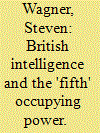

|
|
|
|
|
| Publication |
2014.
|
| Summary/Abstract |
At the end of the Second World War, British intelligence struggled to enforce strict limits imposed on Jewish immigration to Palestine. Holocaust survivors and Jews wishing to escape communism in Eastern Europe flooded the western Zones of occupation in Germany and Austria, while the Zionist movement worked to bring them to Palestine. Illegal immigration to Palestine was the key policy dispute between Britain and the Zionist movement, and a focus for British intelligence. Britain sought both overt and covert means to prevent the boarding of ships at European ports which were destined for Palestine, and even to prevent the entry of Jewish refugees into the American zones. This article highlights Britain's secret intelligence-gathering efforts as well as its covert action aimed to prevent this movement. It highlights a peculiar episode in the 'special relationship' between Britain and the United States, during which cooperation and partnership was lacking. British intelligence promoted a rumour that Soviet agents were using Jewish escape lines to penetrate Western Europe and the Middle East in order to persuade American authorities to prevent the movement of Jewish refugees. Instead, this article argues, American intelligence secretly cooperated with the Zionist organizers of the escape routes so to expose Soviet agents. Britain's attempt at deception backfired, and provided effective cover for the movement of hundreds of thousands of Jews during a critical period. Meanwhile its intelligence had dramatically improved, but policymakers failed to reassess Britain's ability to sustain immigration restrictions and the indefinite detention of tens of thousands of illegal migrants.
|
|
|
|
|
|
|
|
|
|
|
|
|
|
|
|
| 3 |
ID:
170708


|
|
|
|
|
| Summary/Abstract |
This article examines the Zionist business activity in Cyprus during the 1930s and discusses the motives of its ‘relocation’ from Mandatory Palestine to the neighbouring island. By examining the profile of the investors, the article argues that ideological and economic considerations shaped Jewish business networking in the Eastern Mediterranean. Apart from the benefits of trade protectionism, most of the Jewish ventures were run in Cyprus by businessmen devoted to Zionism, whose companies on the island would not only benefit them economically, but further support their role as economic carriers of the future Jewish state. Behind their business engagement, there was also the idea of generating Jewish-friendly settlements close to Palestine, where Jews from Central Europe could be accommodated as the migratory flow from Central Europe in the 1930s was increasing. This particular form of business activity marked also the rise of a Zionist business culture, which relied heavily on British markets.
|
|
|
|
|
|
|
|
|
|
|
|
|
|
|
|
| 4 |
ID:
123058
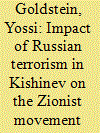

|
|
|
|
|
| Publication |
2013.
|
| Summary/Abstract |
The explosion of terror which took place in the Bessarabian capital in April 1903 and which has since become known as the Kishinev Pogrom had a profound impact on all of Russian Jewry. But as far as the Zionist movement is concerned, and in opposition to what is generally believed about the Pogrom's central role in the history of Zionism, the Pogrom did not lead to any changes in the activities undertaken by the Zionists or in the ideology which they espoused. It was rather that the Pogrom triggered certain phenomena already present in Zionism during the preceding few years.
|
|
|
|
|
|
|
|
|
|
|
|
|
|
|
|
| 5 |
ID:
124918
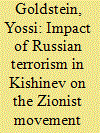

|
|
|
|
|
| Publication |
2013.
|
| Summary/Abstract |
The explosion of terror which took place in the Bessarabian capital in April 1903 and which has since become known as the Kishinev Pogrom had a profound impact on all of Russian Jewry. But as far as the Zionist movement is concerned, and in opposition to what is generally believed about the Pogrom's central role in the history of Zionism, the Pogrom did not lead to any changes in the activities undertaken by the Zionists or in the ideology which they espoused. It was rather that the Pogrom triggered certain phenomena already present in Zionism during the preceding few years.
|
|
|
|
|
|
|
|
|
|
|
|
|
|
|
|
| 6 |
ID:
126971
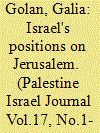

|
|
|
|
|
| Publication |
2011.
|
| Summary/Abstract |
For the past 85 years, the international community, the representatives of the Zionist movement and, later, the State of Israel, the representatives of the Arab world and, especially, the Palestinians, have been engaged in attempts to find ways to make the City of Jerusalem a city of peace. Over this period, more than 65 plans have been tabled for discussions.1 Many people claim that the failure to resolve the issue of Jerusalem is what led to the breakdown of negotiations between Israel and the Palestinian Authority. The latest Palestinian uprising is named the al-Aqsa Intifada after the central role that the Holy Places have played in the latest round of the Israeli-Arab conflict.
|
|
|
|
|
|
|
|
|
|
|
|
|
|
|
|
| 7 |
ID:
138842
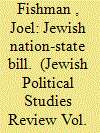

|
|
|
|
|
| Summary/Abstract |
One of the reasons for the breakup of the Netanyahu government in December 2014 was a serious disagreement concerning the “Law of the Nation,” otherwise known as the Jewish Nation-State Bill. According to the prime minister’s fourteen principles for the drafting of the government bill, the purpose of this legislation was “defining the identity of the State of Israel as the nation state of the Jewish people and anchoring the values of the State of Israel as a Jewish and democratic state in the spirit of the principles contained in the Declaration of the Establishment of the State of Israel.” On November 19, 2014, the government approved this text as a starting-point for the Netanyahu-Weinstein version of the bill.
|
|
|
|
|
|
|
|
|
|
|
|
|
|
|
|
| 8 |
ID:
119466
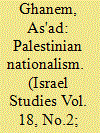

|
|
|
|
|
| Publication |
2013.
|
| Summary/Abstract |
A ccording to the literature there are two types of nationalism: First, Civic (territorial) nationalism emphasizes the common territory and citizenship as the criteria for individualsâ?? inclusion in the national group. 1 Here the national group is the totality of citizens, with no emphasis on their primordial ethnic affiliation; the national culture consists chiefly of civic and universal values. This kind of nationalism is found in France, Great Britain, and the United States. Civic nationalism crystallizes under the shadow of attempts to establish hegemony for the dominant group culture, values and basic beliefs.
|
|
|
|
|
|
|
|
|
|
|
|
|
|
|
|
| 9 |
ID:
174160
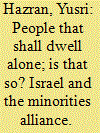

|
|
|
|
|
| Summary/Abstract |
The state of Israel, and the Zionist movement before it, has always considered itself to be facing an existential threat from hostile surroundings. Hence, seeking alliance with non-Arab nations and ethnic minority groups in the area was seen as a means of confronting this challenge. During the early decades of its existence, the Israeli establishment adopted the concept of the alliance of the periphery and the alliance of minorities developed by Israel’s first prime minister, David Ben-Gurion and his protégée, Reuven Shiloah, the founder of the Israeli intelligence service, the Mossad. This research project will demonstrate that, in opposition to apologetic and ideologically-motivated arguments that deny that alliance with minority communities has been a systematic policy, the minorities’ alliance has for decades been an important foundation of Israeli strategy vis-à-vis the Arab world. Furthermore, the article will argue and demonstrate that the ‘Minorities Alliance’ is derived from ideological, historical, and strategic considerations anchored in the very existence of Zionism and Israel. Furthermore, and on the same note, this conception and strategy cannot be disconnected from the self-perception of Zionism, its self-directed reading of Jewish history, and the Zionisation of the milieu.
|
|
|
|
|
|
|
|
|
|
|
|
|
|
|
|
| 10 |
ID:
114168
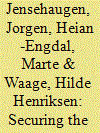

|
|
|
|
|
| Publication |
2012.
|
| Summary/Abstract |
Between early 1947 and May 1948, the Zionist movement went from being a non-state actor representing the minority population within the territory of the British Mandate of Palestine to establishing the State of Israel, which would be recognised almost instantaneously by the world's two Superpowers, the United States and the Soviet Union. Such a result, however, was never a given. What processes allowed a non-state actor, the Zionist movement, to secure international acceptance for the creation of a Jewish state in highly ambiguous circumstances? This analysis explores the dual-track adopted by the Zionist movement, whereby it worked to create facts on the ground within Palestine whilst securing support for its state-building project at the international level. By establishing state-like institutions in Palestine whilst building international support, the Jewish Agency was able to secure for itself a unique place from which to declare statehood.
|
|
|
|
|
|
|
|
|
|
|
|
|
|
|
|
| 11 |
ID:
119468
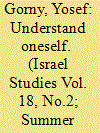

|
|
|
|
|
| Publication |
2013.
|
| Summary/Abstract |
T his article reflects upon the J ewish-A rab conflict from an individual cognitive angle of two leading political figures in the Zionist movementâ??Zeâ??ev Jabotinsky and David Ben-Gurion. I choose them because to intents and purposes they were the prominent leaders of two polar ideological movements: the Hebrew Labor movement, and the Revisionist Party in the Zionist movement in the years 1920â??1940. I do not intend to deal with their policies toward the conflict but rather to explain their political principles, by which they sought to solve it.
|
|
|
|
|
|
|
|
|
|
|
|
|
|
|
|
| 12 |
ID:
192274
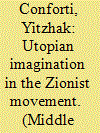

|
|
|
|
|
| Summary/Abstract |
This article examines the last utopian novel of early Zionist thought and literature. The utopia Jerusalem Rebuilt was written after the First World War and published in the mid-1920s by Boris Schatz. This work combined artistic utopian vision and Jewish nationalism, and it reflected the early Zionist vision at the turn of the twentieth century. This article discusses Schatz’s work against the backdrop of Zionist utopian literature that was written between the 1880 s and the end of the First World War. The article suggests that a careful reading of early utopian Zionist literature points to the clear connection between the revolutionary Zionist vision and pre-modern Jewish cultural heritage. Despite the revolutionary character of Zionism, the early utopian literature points to the evolutionary and cultural dimensions of Jewish nationalism.
|
|
|
|
|
|
|
|
|
|
|
|
|
|
|
|
| 13 |
ID:
118543
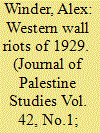

|
|
|
|
|
| Publication |
2012.
|
| Summary/Abstract |
This article analyzes the outbreak of the deadly 1929 riots in Palestine. Focusing on Jerusalem, Safad, and Hebron, the cities most significantly affected by the events, the article sees the violence as attempts to reinforce, redefine, or reestablish communal boundaries. It argues that patterns of violence in each city can help us understand how these boundaries had been established and evolved in the past, as well as the ways in which new forces, in particular the economic, political, and social influence of the Zionist movement and the rise of nationalist politics among the Palestinian Arabs, had eroded older boundaries.
|
|
|
|
|
|
|
|
|
|
|
|
|
|
|
|
| 14 |
ID:
113025
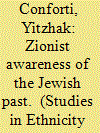

|
|
|
|
|
| Publication |
2012.
|
| Summary/Abstract |
Since the 1980s, the question of how nations are formed has been the topic of historiographic debate: is it correct to define nation-building in terms of inventing traditions, or is the ethnic-symbolic viewpoint more useful in understanding the process of development of the nation-state? This debate is also reflected in research on Jewish nationalism. In this article, I will examine this issue in relation to the Zionist movement, focusing on several clear examples of forging the nation and nation-building: 1) the change in configuration of traditional Jewish holidays; 2) ceremonies and Zionist holidays on kibbutzim; 3) the status of the Bible in the Zionist movement; and 4) Jewish history and Zionist historiography. These examples indicate that the process of nation-building reveals a strong ethnic-cultural link to the Jewish past. I will argue that modern political explanations such as inventing tradition do not offer a full explanation of the phenomenon of Jewish nationalism. In order to arrive at a comprehensive understanding of the success of Zionism in consolidating around it a group willing to commit such a high level of personal sacrifice over time, we must give consideration to cultural-ethnic continuity as well as the feeling of commitment and sanctity that Jewish nationalism offered to its believers, both religious and secular.
|
|
|
|
|
|
|
|
|
|
|
|
|
|
|
|
| 15 |
ID:
129228
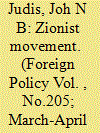

|
|
|
|
|
| Publication |
2014.
|
| Summary/Abstract |
The American Israel Public Affairs Committee (AIPAC), a lobby once dubbed an "800-pound gorilla" for its ability to frighten senators and representatives into supporting its efforts on behalf of Israel, recently seems to have lost a bit of heft. Beginning last fall, it strongly backed legislation that, if passed, could have derailed ongoing negotiations to restrain Iran's nuclear program. That bill obligated President Barack Obama to seek a deal requiring Iran to dismantle all its nuclear facilities, while also forcing him to certify that Iran was neither supporting terrorism nor testing ballistic missiles -- and it would have imposed new sanctions if those conditions were not met. (An interim deal reached last November limited Iran's enrichment activities but did not require the closure of any facilities.) The Obama administration opposed the legislation, but spurred by AIPAC's efforts, the bill garnered 59 co-sponsors in the Senate -- one shy of ensuring that it could overcome a filibuster.
|
|
|
|
|
|
|
|
|
|
|
|
|
|
|
|
|
|
|
|
|